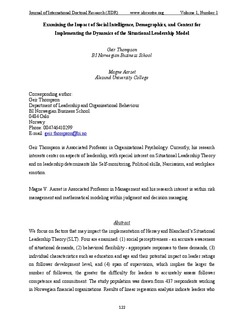| dc.contributor.author | Thompson, Geir | |
| dc.contributor.author | Aarset, Magne | |
| dc.date.accessioned | 2013-05-21T10:58:26Z | |
| dc.date.available | 2013-05-21T10:58:26Z | |
| dc.date.issued | 2012 | |
| dc.identifier.issn | 2328-0832 | |
| dc.identifier.uri | http://hdl.handle.net/11250/93920 | |
| dc.description | This is an open access journal | no_NO |
| dc.description.abstract | We focus on factors that may impact the implementation of Hersey and Blanchard’s Situational Leadership Theory (SLT). Four are examined: (1) social perceptiveness - an accurate awareness of situational demands, (2) behavioral flexibility - appropriate responses to these demands, (3)
individual characteristics such as education and age and their potential impact on leader ratings on follower development level, and (4) span of supervision, which implies the larger the number of followers, the greater the difficulty for leaders to accurately assess follower competence and commitment. The study population was drawn from 437 respondents working in Norwegian financial organizations. Results of linear regression analysis indicate leaders who are more socially aware are better able to rate follower competence and commitment than
leaders who are less aware. Results of omnibus testing support the contention that leaders who are more socially flexible are better able to match leadership style to follower competence and commitment than leaders who are less flexible. Support was obtained for the significance of age for implementation of SLT, as older superiors are better able to rate follower competence
and commitment than younger superiors. Finally, in small groups leaders are better able to rate follower competence and commitment than leaders in larger groups. The evidence suggests other factors may influence leaders’ ability to apply SLT, and these factors should be taken into
consideration when testing the validity of the theory. | no_NO |
| dc.language.iso | eng | no_NO |
| dc.publisher | International Doctoral Reseach Centre | no_NO |
| dc.subject | situational leadership | no_NO |
| dc.subject | social perceptiveness | no_NO |
| dc.subject | behavioral flexibility | no_NO |
| dc.subject | demographics | no_NO |
| dc.subject | span of supervision | no_NO |
| dc.title | Examining the impact of social intelligence, demographics, and context for implementing the dynamics of the situational leadership model | no_NO |
| dc.type | Journal article | no_NO |
| dc.type | Peer reviewed | no_NO |
| dc.source.pagenumber | 122-142 | no_NO |
| dc.source.volume | 1 | no_NO |
| dc.source.journal | Journal of International Doctoral Research | no_NO |
| dc.source.issue | 1 | no_NO |
